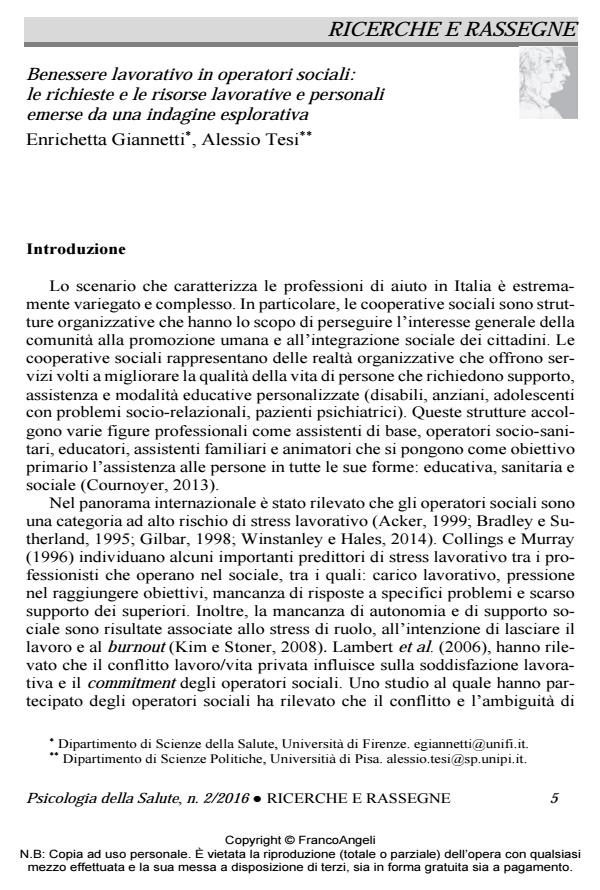Benessere lavorativo in operatori sociali: le richieste e le risorse lavorative e personali emerse da una indagine esplorativa
Titolo Rivista PSICOLOGIA DELLA SALUTE
Autori/Curatori Enrichetta Gianneti, Alessio Tesi
Anno di pubblicazione 2016 Fascicolo 2016/2
Lingua Italiano Numero pagine 22 P. 5-26 Dimensione file 247 KB
DOI 10.3280/PDS2016-002001
Il DOI è il codice a barre della proprietà intellettuale: per saperne di più
clicca qui
Qui sotto puoi vedere in anteprima la prima pagina di questo articolo.
Se questo articolo ti interessa, lo puoi acquistare (e scaricare in formato pdf) seguendo le facili indicazioni per acquistare il download credit. Acquista Download Credits per scaricare questo Articolo in formato PDF

FrancoAngeli è membro della Publishers International Linking Association, Inc (PILA)associazione indipendente e non profit per facilitare (attraverso i servizi tecnologici implementati da CrossRef.org) l’accesso degli studiosi ai contenuti digitali nelle pubblicazioni professionali e scientifiche
Il benessere lavorativo rappresenta un tema centrale nella Psicologia della Salute. L’obiettivo di questo studio esplorativo è stato indagare le rappresentazioni del benessere lavorativo e le dimensioni che concorrono a promuoverlo tra 21 operatori di una cooperativa sociale. Sono stati condotti tre focus group. Le conversazioni sono state registrate, trascritte integralmente e sottoposte ad analisi di contenuto qualitativa (Losito, 2009). Sono state scelte le unità di analisi (frasi) e, induttivamente a partire dai dati grezzi (strutturazione dei contenuti ex-post), sono state generate categorie relative sia alle rappresentazioni del benessere lavorativo degli operatori sociali, sia alle dimensioni che concorrono a promuoverlo. Le categorie emerse sono state ricondotte deduttivamente (strutturazione dei contenuti ex-ante) a soluzioni macrocategoriali definite rispettivamente "benessere lavorativo", "richieste lavorative", "risorse lavorative" e "risorse personali", basandosi sul modello teorico Job Demands-Resources. Il benessere lavorativo viene concettualizzato dagli operatori come uno stato di piacevolezza associato alla conduzione del proprio lavoro. Tra le richieste lavorative sono emerse scarsa qualità della comunicazione in cooperativa, conflitto lavoro-vita privata, scarsa collaborazione con le famiglie degli utenti, richieste emotive, elevato carico lavorativo psicologico, scarsa autonomia, stipendio inadeguato, difficoltà ad attribuire un senso al lavoro e confusione nei ruoli. Tra le risorse lavorative sono state segnalate: supporto dei colleghi, partecipazione al processo di decision making, ricompense, buona gestione delle risorse umane, ambienti lavorativi piacevoli, elevata flessibilità/autonomia lavorativa, tutela dei diritti e tempo libero. Come risorse personali sono emerse le competenze emotive, comunicative e relazionali. Richieste e risorse possono promuovere il benessere lavorativo attraverso processi di tipo motivazionale.
Parole chiave:Analisi di contenuto, benessere lavorativo, job demands-resources model, peratori sociali.
- Trait authenticity as an “enzyme” for personal resources and work engagement: A study among teachers within the framework of the job demands-resources model Alessio Tesi, Andrea Baroncelli, Enrica Ciucci, Carolina Facci, Antonio Aiello, in European Review of Applied Psychology 101012/2024 pp.101012
DOI: 10.1016/j.erap.2024.101012 - The relationship between need for closure and compliance to harsh power tactics in high demanding jobs: A study conducted among firefighters and social workers Daniela Di Santo, Alessio Tesi, Antonio Aiello, Antonio Pierro, in Journal of Applied Social Psychology /2020 pp.599
DOI: 10.1111/jasp.12698 - Lavorare in centri per uomini violenti affrontandone l'invisibilità della violenza Fortuna Procentese, Immacolata Di Napoli, Caterina Arcidiacono, Marina Cerqua, in PSICOLOGIA DELLA SALUTE 3/2019 pp.123
DOI: 10.3280/PDS2019-003007 - A Dual Path Model of Work-Related Well-Being in Healthcare and Social Work Settings: The Interweaving Between Trait Emotional Intelligence, End-User Job Demands, Coworkers Related Job Resources, Burnout, and Work Engagement Alessio Tesi, in Frontiers in Psychology 660035/2021
DOI: 10.3389/fpsyg.2021.660035 - Secondary Traumatisation of Social Workers Supporting Traumatised Children and Their Families: A Preliminary Qualitative Inquiry Marzia Saglietti, in Australian Social Work /2025 pp.500
DOI: 10.1080/0312407X.2025.2544852 - Moving forward to social workers’ work engagement: Framing the regulatory modes and the job demands-resources model Alessio Tesi, in Journal of Workplace Behavioral Health /2021 pp.146
DOI: 10.1080/15555240.2021.1931260 - “Kept in Check”: Representations and Feelings of Social and Health Professionals Facing Intimate Partner Violence (IPV) Immacolata Di Napoli, Stefania Carnevale, Ciro Esposito, Roberta Block, Caterina Arcidiacono, Fortuna Procentese, in International Journal of Environmental Research and Public Health /2020 pp.7910
DOI: 10.3390/ijerph17217910
Enrichetta Gianneti, Alessio Tesi, Benessere lavorativo in operatori sociali: le richieste e le risorse lavorative e personali emerse da una indagine esplorativa in "PSICOLOGIA DELLA SALUTE" 2/2016, pp 5-26, DOI: 10.3280/PDS2016-002001